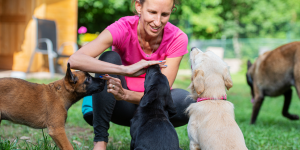Why Do Dogs Play?
It may seem like an odd question, ‘why do dogs play?’ but everyone certainly loves to watch their having fun. Young puppies, particularly, seem to get such delight from playtime. This Holidays4Dogs article takes a closer at dogs at play; what games they seem to enjoy most and what benefits they gain from it.
Play is a crucial part of growing up for dogs, because it’s how they learn about their environment and their social world. Playing with other dogs helps puppies to learn how to communicate with their four legged peers and learn the rules of canine etiquette.
Certain types of play can be seen during different periods of a puppy’s life. Early on, they engage in mouthing play; then, they will begin to instigate play with other dogs, as well as mock fighting games. Later, play is associated with reproduction.
Physical and mental wellbeing.
While they are playing, young puppies are able to exercise their bodies as well as their brains and, therefore, it is an essential part of growing up.
are able to exercise their bodies as well as their brains and, therefore, it is an essential part of growing up.
Puppies, or dogs, that don’t play might be feeling unhappy, or unwell. However, most domestic canines will pursue the pleasure of play throughout their lives.
Dogs will often play together, but it is not unusual for them to amuse themselves alone. It is a delight to see a fully grown dog taking pleasure from engaging with toys, all by himself.
My own dog, Floss, will amuse herself for hours with her collection of soft toys. (On more than one occasion, I have had a soggy wet toy land in my face, or on top of my coffee mug!).
Learning through play.
Playing together helps puppies to learn vocal signals and body language. It is, therefore, important to socialise a new puppy with other calm dogs.
Some dogs don’t seem to know how to play. When I acquired Floss as an adult rescue dog, she really had no concept of how to play. This was possibly due to lack of suitable socialisation as a puppy. Not understanding the concept of play, Floss seemed quite an unhappy dog.
Once I had taught her to play with a ball, she realised how much enjoyment could be had. Due to her lack of social exposure before I took her in, she still doesn’t enjoy socialising with other dogs. This is why it is even more important for her to engage in play with her human family, as well as on her own.
Play nicely!
It is always important to monitor your dog when he is playing with others. If your pet engages with other pooches who are too rough and persist in body slamming, or harsh wrestling, this may lead to aggression issues. With other puppies this can encourage fearful behaviour, resulting in the pup wanting to avoid contact with other dogs.
Older pups should be supervised to make sure they don’t play too roughly. The most important thing is to know how to recognise when play becomes too rough.
Studies have shown that play helps dogs to learn to inhibit aggression and exercise appropriate restraint.
Puppy play groups.
There are many puppy socialisation classes around the country. These classes can provide opportunity for pups to meet and engage in play, under expert supervision. It is suggested that puppies that play, are more likely to be more well adjusted and friendly as adults. In addition, studies have shown that when dogs learn to play with people, often grow up to be more sociable with humans.
are more likely to be more well adjusted and friendly as adults. In addition, studies have shown that when dogs learn to play with people, often grow up to be more sociable with humans.
Play between dogs should always be well balanced, where each animal can be seen clearly having fun with lots of give and take.
Bodies should be soft and relaxed. Both participants should make friendly gestures such as play bowing, or stopping the game if things become too heated.
If the dogs begin in excessive neck grabbing, barking, lunging, growling, body slamming, snapping, biting or mounting – you should always intervene. As puppies grow into adults they will usually only engage in play with dogs they have previously known, or live with, and tend not to play with strange dogs.
Conclusion.
Watching puppies play has to be one of the most engaging things an owner can experience. It is always a great time waster! Dogs seem to retain their enjoyment of having fun long into adulthood. With my own dogs, watching them happy at play reminds me of the simple pleasures in life, so often overlooked.


